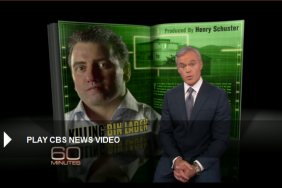
A Facebook friend, Canadian television host Carolyn Weaver, posted a link to a fascinating 60 Minutes episode in which CBS correspondent Scott Pelley interviews “Mark Owen” (pseudonym), a retired Navy SEAL who was in the room when Osama bin Laden was killed in his compound in Abbottobad, Pakistan. Owen has just published a book about his experiences during the raid. It’s called No Easy Day.
Although I didn’t really have the time (deadlines!) I ended up watching the entire thing, and I’m glad I did. The story may be familiar from its wide coverage in the press at the time it happened. And Owen himself doesn’t reveal anything he considers to be secret. So there’s no real insight into intelligence operations that preceded the raid or even much about the tactics used by SEALs when the hit the ground on assignments such as this one.
What CBS has done instead – on purpose or by accident – is offer an insight into the psychology of these ultra-elite hand-picked soldiers. Owen isn’t cold, exactly. But he is incredibly controlled. In one passage, he describes how the movies get it wrong by always depicting operations like the one in Pakistan as loud and fast. Instead, he tells us, when SEALs do their jobs, they do it slowly and quietly.
“We have a saying,” Owen remarks at one point: “Don’t run to your own death.”
While all that is fascinating, I found watching that I experienced something like mounting dread. Working on a piece about PTSD for Harpers has perhaps put me in this mindset, but I could not help but wonder at the toll his work would ultimately take on Owen.
He betrays very little, it has to be said, until almost his final words of the program. In that moment, he’s describing the emotion he experienced in visiting the 9/11 memorial in NYC. Pelley comments: over three thousand people died there. Owen nods. He’s well aware of it, of course.
The raid avenged those people, Pelley suggests. And here Owen agrees.
It is a chilling moment. Because we sense that Owen’s awareness of the raid as an act of vengeance may not sit with him quite as easily as it appears to sit with Pelley, who makes the comment as if to balance the books, as if to establish that in the wake of the raid, ammends had been made, peace restored.
Owen, to my eye, does not seem so sure. He says instead that he realized in that moment, at the memorial, that it was time for him personally to move on. And then he says the words.
“Full circle,” the former Navy SEAL says, with no trace of satisfaction.
How rich, insightful, and devastating is that casual formulation. The full circle, of course, returns us to the site of our departure, as if we had never left. What will Owen do with this understanding? I can’t speculate, only to say that it seems to me, in that room, he glimpsed the expediency and (maybe) even the practical necessity of an act that would yet necessarily only perpetuate itself in further violence, further requirements for vengeance, further full circles spinning on up into the unknowable future. Spinning and escalating.
But maybe the more important question is what should we do with that understanding?

